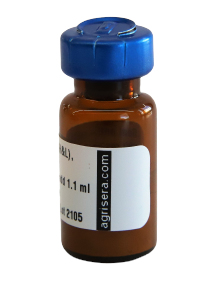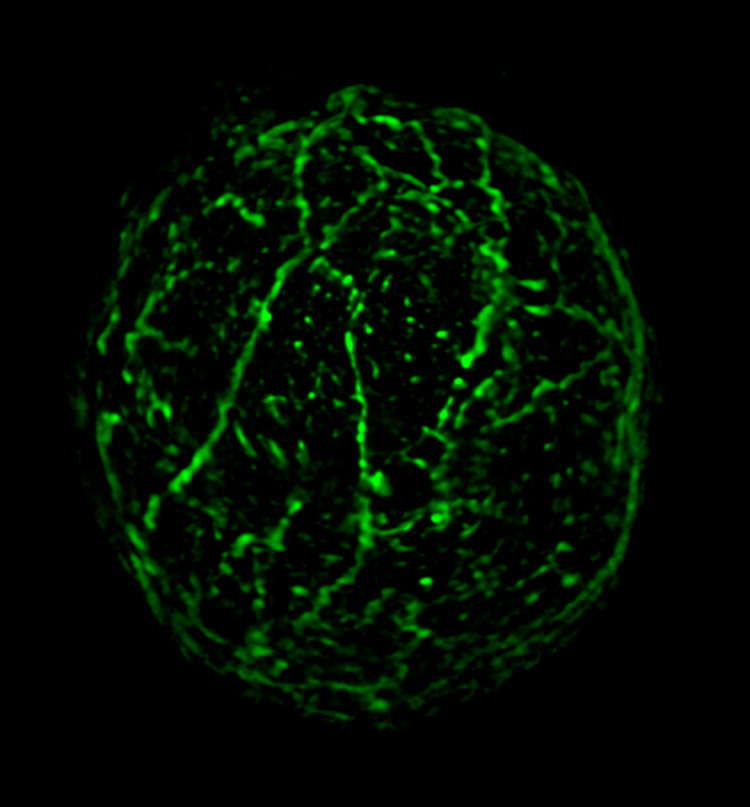1

Donkey anti-Mouse IgG (H&L), DyLight® 488 conjugated, min, cross-reactivity to bovine, chicken, goat, guinea pig, hamster, horse, human, rabbit, rat or sheep IgG
AS10 1201 | Clonality: Polyclonal | Host: Donkey | Reactivity: Mouse IgG (H&L)
- Product Info
-
Immunogen: Purified Mouse IgG, whole molecule
Host: Donkey Clonality: Polyclonal Purity: Immunogen affinity purified donkey IgG. Format: Lyophilized Quantity: 1 mg Reconstitution: For reconstitution add 1.1 ml of sterile water. Let it stand 30 minutes at room temperature to dissolve. Prepare fresh working dilutions daily Storage: Store lyophilized material at 2-8°C. Product is stable for 4 weeks at 2-8°C after rehydration. For long time storage after reconstitution, dilute the antibody solution with glycerol to a final concentration of 50% glycerol and store as liquid at -20°C, to prevent loss of enzymatic activity. For example, if you have reconstituted 1 mg of antibody in 1.1 ml of sterile water add 1.1 ml of glycerol. Such solution will not freeze in -20°C, If you are using a 1:5000 dilution prior to diluting with glycerol, then you would need to use a 1:2500 dilution after adding glycerol. Prepare working dilution prior to use and then discard. Be sure to mix well but without foaming. Recommended dilution: 1 : 20-1 : 2000 for most applications - Application Examples
-

Sample: Maize protoplasts fixed in 4% paraformaldehyde in 1X PBS pH 7.4 for 1 hour and washed 3 times in 1XPBS buffer
Primary antibodies: Agrisera AS21 4615 actin monoclonal; clone 14H4G8;
Secondary antibodies: Donkey anti-Mouse IgG (H&L), DyLight® 488 conjugated AS10 1201 (Agrisera)
Other reagents: 30% Bovine Serum Albumin solution, Sigma Aldrich Cat # A8577-50ML; Phosphate Buffered Saline 10X, Electron Microscopy Sciences Cat # 19342-10; Imaging spacer, Millipore Sigma Grace Bio-Labs SecureSeal™ imaging spacer Cat # GBL654008
Protocol:
- Block isolated protoplasts in a blocking buffer (2% BSA in 1x PBS) for 1 h at room temperature.
- Dilute the primary antibody to 1: 500 in a blocking buffer, mix well, and spin down at 150 x g for 3 min:
- Spin down protoplasts in a blocking buffer at 150 g for 1 -3 min and remove as much supernatant as possible using a pipette tip with a cut end (wide opening).
- Resuspend protoplasts in diluted antibody and incubate for 1 h at room temperature.
- Spin down protoplasts at 150 g for 1 min and remove as much supernatant as possible using a pipette tip with a cut end.
- Wash protoplasts in a blocking buffer 3 times for 5 minutes each. Spin and resuspend as described in step 5 between each washing step.
- Dilute the secondary antibody AS10 1201 to 1: 400, mix well, and spin down at 150 x g for 3 min:
- Incubate protoplasts in diluted antibody for 1 h at room temperature.
- Repeat the washing steps as described in 5-6.
- Resuspend a protoplast pellet in a small volume of PBS 1X, pH 7.4.
- Prepare microscopy slide: attach imaging spacer on top of the slide, peal off top adhesive membrane, add protoplast suspension on to the slide inside the spacer opening, cover with 22x22 mm cover glass No 1.5.
- Imaging: Zeiss Elyra 7 SIM
Courtesy of Dr. Kirk Czymmek, The Danforth Plant Science Centre, USA - Additional Information
-
Additional information: Conjugate is present in 10 mM Sodium Phosphate, 0.15 M Sodium Chloride, pH 7.2, 1 % (w/v) BSA, Protease/IgG free. 0.05 % (w/v) sodium azide is added as preservative.
Based on immunoelectrophoresis, this antibody reacts with: heavy (γ) chains on mouse IgG, light chains on all mouse immunoglobulinsNo reactivity is observed to: non-immunoglobulin mouse serum proteins, IgG from bovine, chicken, goat, guinea pig, hamster, horse, human, rabbit, rat or sheep
- Background
-
Background: Donkey anti-Mouse IgG (H&L), DyLight®488 Conjugated, min. cross-reactivity to bovine, chicken, goat, guinea pig, hamster, horse, human, rabbit, rat or sheep IgG is a secondary antibody conjugated to DyLight® 488, which binds to Mouse IgG (H&L) in immunological assays.
DyLight® 488 has Amax = 493 nm, Emax = 518 nm. Antibodies are purified using solid phase Mouse IgG (H&L)
DyLight® is a registered trade mark of Thermofisher Inc., and its subsidaries.
- Product Citations
-
Selected references: Maurya et al. (2017). Hedgehog signaling regulates ciliary localization of mouse odorant receptors. Proc Natl Acad Sci U S A. 2017 Oct 31;114(44):E9386-E9394. doi: 10.1073/pnas.1708321114. - Protocols
- Antibody protocols
- Reviews:
-
This product doesn't have any reviews.




